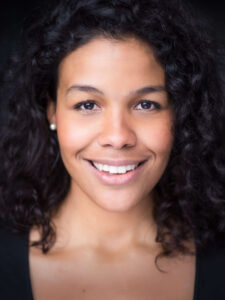When actor Zahra Newman saw Audra McDonald play Billie Holiday in Lady Day at Emerson’s Bar & Grill on Broadway in 2014, she immediately had two thoughts. “One, that I definitely wanted to try and do it,” she recalls, “and the second that I was terrified! I felt that I couldn’t possibly do it. Both of those opposing feelings were equally strong, because it felt like a really daunting task to take on – as any show that attempts to replicate the life of a person who actually existed is always a challenge.”

Written by US playwright Lanie Robertson, the piece – more one-woman play with songs than cabaret – depicts Holiday shortly before her death in 1959, singing in Philadelphia, because a narcotics possession conviction barred her from performing in New York.
In her teens, Newman admired Holiday’s unique sound, phrasing and emotional impact. Later, when she learned what lay behind Holiday’s 1939 hit, Strange Fruit (the lynching of two black men in the “gallant South”), and saw the song’s place in the evolving Civil Rights movement, she became interested in her life, as well.
In playing her, Newman says that finding a truthful way of bringing her to life on stage is only partly about imitation. “While we try to be as close as possible to the real person,” she observes, “we also have a responsibility to tell the story. We want to be able to honour her and meet the authenticity of who she was, but also be fully aware that I’m not a kind of weird, magic person who turns into other people.
“I’m never going to actually be Billie Holiday, because I’m a totally different person in a different time with a different physiological specificity to my voice. The focus is about transporting people: that people feel like they’ve been transported a jazz club in Philadelphia in 1959. My aim is to evoke the feelings that people have had or continue to have when they listen to Billie Holiday. Sometimes if you just focus solely on trying to mimic, you end up losing some sense and clarity on other stuff… For me it was about trying to get as close to her sound quality, but also, within that, still wanting to be able to tell a fluent and cohesive story.”

Part of that story, drawing on the autobiography that Holiday co-wrote, Lady Sings the Blues, tells of her love of collaborating with bands (so Newman shares the stage with a trio), of the blues and of Louis Armstrong’s trumpet playing. She wanted to sound like a horn and be a band member rather than a star vocalist. Newman says she has tried to find her own way of doing this, and believes this makes for a more rounded performance than simply impersonating Holiday.
Holiday’s life, beginning with being jettisoned by her parents and then being raped at 10, piled tragedy on trial in a way that would have broken many, and yet she still managed to emerge as one of the 20th century’s greatest singers. Newman emphasises that Holiday didn’t see herself as a victim: “She’s got a lot of really dark, sharp thorny humour that is attached to the way she perceives the hardships and challenges she’s been through… She wasn’t great because of all the terrible things that happened in her life. She was great! There’s a consciousness from us, the team behind the show, to make sure we’re not pathologizing a mythology around trauma and pain.

“She connected to lyrics in a really intimate way,” Newman adds, “and was able to filter them through herself, but she was more attracted to having a great band, and I think she just loved to sing with bands and make music.”
In finding her own way of getting inside Holiday, Newman’s collaboration with director Mitchell Butel has been crucial. “As a performer I really depend on that outside eye,” she says, “and need to feel a real sense of security that that person is looking after you, because there’s only so much you can do. You’ve got your instincts on stage, but you’re not going to see it, unlike when you’re in a play with a bunch of people, and you can sit outside and see how the story is unfolding, and you get a sense of where you fit into that story. But when you’re on stage the whole time, you don’t get that. I think that it actually brings out the best in both the performer and the director. We have to push each other to come up with the best version.”
Lady Day at Emerson’s Bar & Grill: Belvoir St Theatre, September 14-October 15.